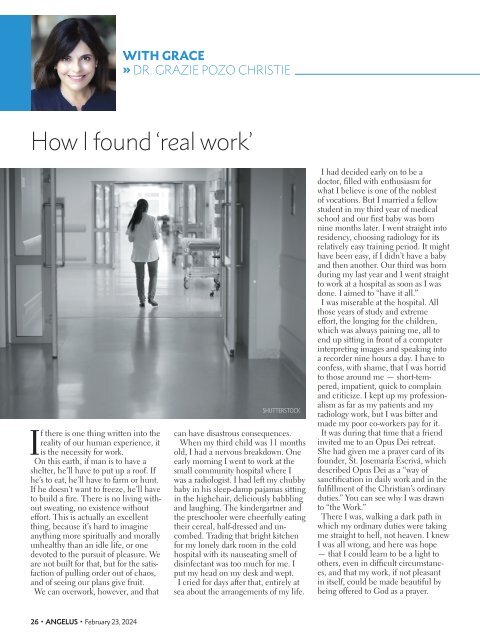Angelus News | February 23, 2024 | Vol. 9 No. 4
On the cover: A painting depicting Jesus in the Garden of Gethsemane by 19th-century artist Carl Heinrich Bloch. For Christians, Lent can be compared to the time Jesus spent praying in the desert. But we may also find ourselves this time of year in the agony of the garden, going through our own Gethsemane of personal suffering. On Page 10, Msgr. Richard Antall reflects on two traditional prayers to the same angel that comforted Christ on the Mount of Olives.
On the cover: A painting depicting Jesus in the Garden of Gethsemane by 19th-century artist Carl Heinrich Bloch. For Christians, Lent can be compared to the time Jesus spent praying in the desert. But we may also find ourselves this time of year in the agony of the garden, going through our own Gethsemane of personal suffering. On Page 10, Msgr. Richard Antall reflects on two traditional prayers to the same angel that comforted Christ on the Mount of Olives.
Create successful ePaper yourself
Turn your PDF publications into a flip-book with our unique Google optimized e-Paper software.
WITH GRACE<br />
DR. GRAZIE POZO CHRISTIE<br />
How I found ‘real work’<br />
If there is one thing written into the<br />
reality of our human experience, it<br />
is the necessity for work.<br />
On this earth, if man is to have a<br />
shelter, he’ll have to put up a roof. If<br />
he’s to eat, he’ll have to farm or hunt.<br />
If he doesn’t want to freeze, he’ll have<br />
to build a fire. There is no living without<br />
sweating, no existence without<br />
effort. This is actually an excellent<br />
thing, because it’s hard to imagine<br />
anything more spiritually and morally<br />
unhealthy than an idle life, or one<br />
devoted to the pursuit of pleasure. We<br />
are not built for that, but for the satisfaction<br />
of pulling order out of chaos,<br />
and of seeing our plans give fruit.<br />
We can overwork, however, and that<br />
SHUTTERSTOCK<br />
can have disastrous consequences.<br />
When my third child was 11 months<br />
old, I had a nervous breakdown. One<br />
early morning I went to work at the<br />
small community hospital where I<br />
was a radiologist. I had left my chubby<br />
baby in his sleep-damp pajamas sitting<br />
in the highchair, deliciously babbling<br />
and laughing. The kindergartner and<br />
the preschooler were cheerfully eating<br />
their cereal, half-dressed and uncombed.<br />
Trading that bright kitchen<br />
for my lonely dark room in the cold<br />
hospital with its nauseating smell of<br />
disinfectant was too much for me. I<br />
put my head on my desk and wept.<br />
I cried for days after that, entirely at<br />
sea about the arrangements of my life.<br />
I had decided early on to be a<br />
doctor, filled with enthusiasm for<br />
what I believe is one of the noblest<br />
of vocations. But I married a fellow<br />
student in my third year of medical<br />
school and our first baby was born<br />
nine months later. I went straight into<br />
residency, choosing radiology for its<br />
relatively easy training period. It might<br />
have been easy, if I didn’t have a baby<br />
and then another. Our third was born<br />
during my last year and I went straight<br />
to work at a hospital as soon as I was<br />
done. I aimed to “have it all.”<br />
I was miserable at the hospital. All<br />
those years of study and extreme<br />
effort, the longing for the children,<br />
which was always paining me, all to<br />
end up sitting in front of a computer<br />
interpreting images and speaking into<br />
a recorder nine hours a day. I have to<br />
confess, with shame, that I was horrid<br />
to those around me — short-tempered,<br />
impatient, quick to complain<br />
and criticize. I kept up my professionalism<br />
as far as my patients and my<br />
radiology work, but I was bitter and<br />
made my poor co-workers pay for it.<br />
It was during that time that a friend<br />
invited me to an Opus Dei retreat.<br />
She had given me a prayer card of its<br />
founder, St. Josemaría Escrivá, which<br />
described Opus Dei as a “way of<br />
sanctification in daily work and in the<br />
fulfillment of the Christian’s ordinary<br />
duties.” You can see why I was drawn<br />
to “the Work.”<br />
There I was, walking a dark path in<br />
which my ordinary duties were taking<br />
me straight to hell, not heaven. I knew<br />
I was all wrong, and here was hope<br />
— that I could learn to be a light to<br />
others, even in difficult circumstances,<br />
and that my work, if not pleasant<br />
in itself, could be made beautiful by<br />
being offered to God as a prayer.<br />
26 • ANGELUS • <strong>February</strong> <strong>23</strong>, <strong>2024</strong>

















